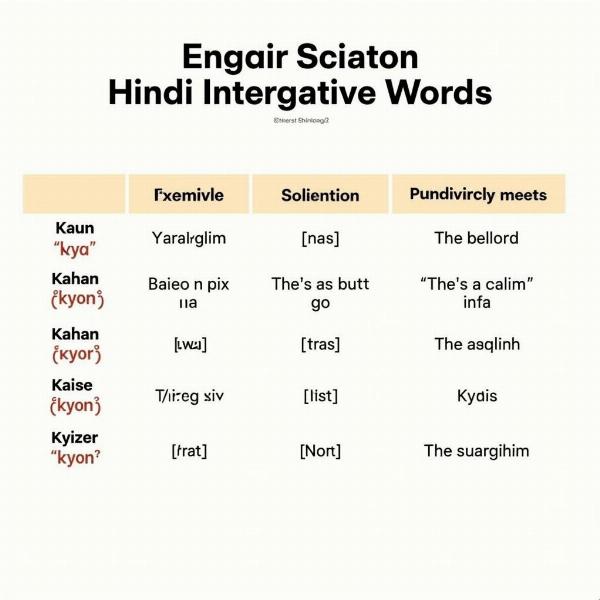Understanding the nuances of Hindi can be challenging, especially when it comes to expressing doubt or inquiry. This article explores the various ways to convey “questioningly” in Hindi, delving into the subtle differences between similar terms and providing practical examples to ensure you communicate effectively. Whether you’re a student, a traveler, or simply curious about the Hindi language, this guide will equip you with the tools to express yourself questioningly in a variety of contexts.
Expressing “Questioningly” with Interrogative Words
Hindi offers a rich array of interrogative words that can be used to express “questioningly.” These words, when used correctly, add depth and precision to your inquiries. Let’s explore some of the most common ones:
- क्या (Kya): This is the most basic interrogative word, equivalent to “what” in English. It can be used to form simple questions like “क्या हुआ? (Kya hua?)” meaning “What happened?”
- कौन (Kaun): Meaning “who,” this word is essential for asking about people. For example, “कौन है? (Kaun hai?)” translates to “Who is it?”
- कहाँ (Kahan): This translates to “where” and is used to inquire about locations. “कहाँ जा रहे हो? (Kahan ja rahe ho?)” means “Where are you going?”
- कब (Kab): Meaning “when,” this word helps you ask about time. “कब आओगे? (Kab aaoge?)” means “When will you come?”
- कैसे (Kaise): Translating to “how,” this word is crucial for understanding processes or methods. “कैसे करोगे? (Kaise karoge?)” means “How will you do it?”
- क्यों (Kyon): Meaning “why,” this word is used to inquire about reasons. “क्यों गए? (Kyon gaye?)” means “Why did you go?”
 Hindi Interrogative Words
Hindi Interrogative Words
Conveying Doubt with Specific Verbs and Adverbs
Beyond interrogative words, specific verbs and adverbs can subtly convey a questioning tone in Hindi.
- शायद (Shayad): This adverb means “perhaps” or “maybe” and is useful for expressing uncertainty. For instance, “शायद वह आएगा (Shayad vah aayega)” translates to “Perhaps he will come.”
- लगता है (Lagta hai): This phrase means “it seems” and can be used to express a tentative opinion or observation. “मुझे लगता है कि वह सही है (Mujhe lagta hai ki vah sahi hai)” means “It seems to me that he is right.”
Questioningly in Different Contexts
The way you express “questioningly” can vary depending on the context.
Formal vs. Informal
In formal settings, using polite forms of address and respectful language is crucial. For instance, instead of “क्या हुआ? (Kya hua?),” you might use “क्या बात है? (Kya baat hai?)” which translates to “What is the matter?”
Written vs. Spoken Hindi
Written Hindi often employs more formal vocabulary and grammatical structures than spoken Hindi.
Cultural Nuances
Understanding cultural nuances is essential. For instance, direct questioning might be considered rude in some situations.
Expert Insights
Dr. Anika Sharma, a renowned linguist specializing in Hindi, notes, “Mastering the art of questioning in Hindi involves not just knowing the words, but also understanding the subtle cultural nuances that govern their usage.”
Conclusion
Expressing “questioningly” in Hindi requires a nuanced understanding of grammar, vocabulary, and cultural context. By mastering the interrogative words, verbs, adverbs, and cultural nuances discussed in this article, you can confidently navigate various conversational scenarios and express your inquiries with clarity and precision.
FAQ
- What is the simplest way to ask a question in Hindi? Using “क्या (Kya)” is the most basic way to form a question.
- How do I ask “where” in Hindi? Use “कहाँ (Kahan)” to ask about location.
- What is the difference between “शायद (Shayad)” and “लगता है (Lagta hai)”? “Shayad” expresses uncertainty, while “Lagta hai” expresses a tentative opinion.
- Is there a difference between formal and informal questioning in Hindi? Yes, formal settings require more polite language and forms of address.
- Why is understanding cultural context important when asking questions in Hindi? Cultural nuances influence how questions are perceived and can impact communication.
- What are some other ways to express doubt in Hindi? You can use phrases like “हो सकता है (Ho sakta hai)” meaning “It’s possible” or “मुझे संदेह है (Mujhe sandeh hai)” meaning “I doubt it.”
- Where can I learn more about Hindi grammar? There are many online resources and textbooks available for learning Hindi grammar.
Connect with Meaning-Hindi.in for Expert Hindi Translation Services
Meaning-Hindi.in is your trusted partner for professional Hindi translation services. We specialize in Business & Commercial, Legal, Technical, Website Localization, Educational, and Urgent translations, ensuring accurate and culturally sensitive communication. Whether you need documents translated, website content localized, or interpretation services, our expert team delivers high-quality results. Contact us today for a free quote and discover how we can help you bridge the language gap! Email: [email protected], Phone: +91 11-4502-7584. Meaning-Hindi.in offers a wide range of specialized translation services to meet your unique needs.